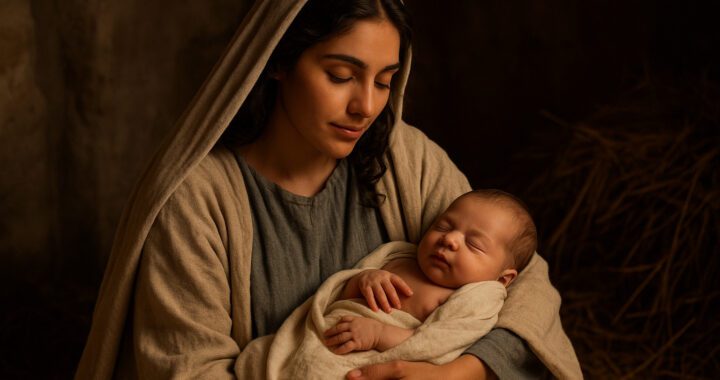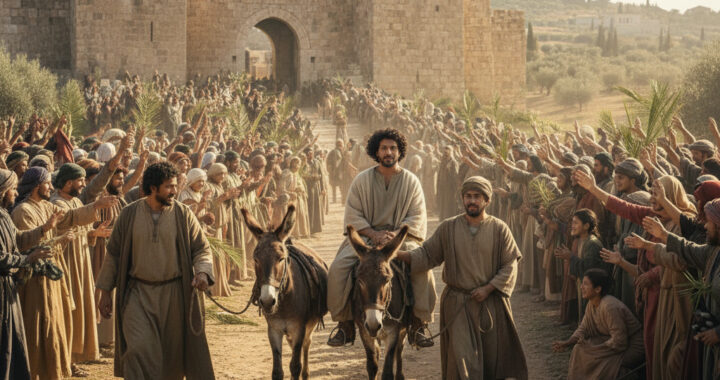INTRODUCTION
According to the Gospel of Matthew, the virgin Mary was found to be with child of the Holy Spirit. Jesus the Messiah was miraculously conceived, and, several months later, God was with us. The birth of the Messiah took place in this way, according to Matthew 1:23, in fulfillment of a prophecy—“Look! The virgin will be pregnant and give birth to a son. They will call his name ‘Immanuel’ which is translated, ‘God with Us.’”
From Matthew’s account, the virgin birth of Jesus the Messiah is miraculous but simple, and straightforward. When one reads the Old Testament context, however, that simplicity is quickly questioned. Some have questioned the validity of this prophecy, some have argued for two fulfillments, and others contend Isaiah prophesied something he did not quite understand. This article argues that Isaiah prophesied a single prophecy with a single meaning—a virgin will conceive and give birth to a son, Immanuel.
HISTORICAL SETTING
The virgin birth prophecy is couched in a specific historical situation that concerns three kings: Ahaz king of Judah, Rezin king of Syria, and Pekah king of Israel. Rezin and Pekah allied themselves together against Assyria and sought the support of Ahaz. Ahaz refused. As a result, Rezin and Pekah prepared for war, seeking to supplant Ahaz and replace him with a king who would fight against Assyria with them. This military maneuver stirred great fear in Judah (Isa 7:3).
The Lord sent his prophet, Isaiah, to assure Ahaz that Rezin and Pekah’s plan would come to nothing (Isa 7:4–9). Isaiah told Ahaz, “Be calm! Do not be afraid, nor be timid.” Ahaz simply needed to trust the Lord. If Ahaz failed to trust the Lord, then he would “not be established” (Isa 7:9).
Even after this exhortation and promise, the Lord spoke to Ahaz again, “Ask a sign for yourself from the Lord your God—a deep request, or a high one, up to the heights” (Isa 7:11). Ahaz, however, had already decided not to trust the Lord. Instead, he sent money to Tiglath- Pilesar, king of Assyria (2 Kgs 16:8). Ahaz refused the Lord’s merciful gift of a sign and replied, “I will not ask, nor will I test the Lord” (Isa 7:12).
Tiglath-Pilesar did help Ahaz. He invaded Syria and Israel. Both countries capitals were taken and their people deported in the succeeding years. But Assyria did not stop its invasion. Assyria also invaded Ahaz’s country—Judah. Isaiah prophesied, “The Lord will bring the king of Assyria upon you, your people, and your father’s house” (Isa 7:17). Tiglath-Pilesar’s successor, Sennacherib, would conquer all of Judah except Jerusalem. Ahaz’s son, Hezekiah, was pinned up in Jerusalem like a bird caught in a cage (Isa 36–39).
THE NATURE OF BIBLICAL PROPHECY
Between Isaiah 7:12 and 15, Isaiah wrote the prophecy that the virgin would conceive and give birth to the Immanuel child. Because all of Isaiah 7 concerns a prophecy that applied to Ahaz and his political situation, many theologians and commentators have argued that the virgin birth prophesy must be some kind of double fulfillment. Jewish apologists mock and claim that Christians have ripped this verse out of its historic context and the Gospel of Matthew has read a meaning into the text that was never intended. They claim this text has nothing to do with Jesus or any supposed “virgin” birth. Yet one argument in favor of the virgin birth comes from the nature of biblical prophecy. Two points should be noted: the significance of a “sign” and the gaps between the two comings of Jesus the Messiah.
Sign
The virgin birth prophecy is actually a sign. Signs were given to validate long-term prophecies. In Ahaz’ specific situation, Ahaz could have asked the sun to go dark or the earth to split apart. A short-term sign (e.g., darkened sun) would validate a long-term prophecy (e.g., two kings will be extinguished). First, the “sign” would need to be something miraculous. The conception of the Messiah by the Holy Spirit would qualify as a miraculous event. Those who believe in a historic fulfillment lack a miraculous event. Attempts to find a fulfilment in Ahaz’ wife or some other courtly “young maiden” are unconvincing. Young ladies have been marrying, conceiving, and giving birth since the beginning of time. The Hebrew article “the” denotes that this virgin is a unique person—the virgin who gives birth to Immanuel.1
Gaps
The Hebrew prophets did not see a distinction between the two comings of Jesus the Messiah. Isaiah 61:1–2 illustrate this truth. In Luke 4:18–20, Jesus picked up the Isaiah scroll and read Isaiah 61, “The Spirit of the Lord is upon me . . . to proclaim the acceptable year of the Lord. Then He rolled up the scroll, and giving it back to the attendant, he sat down.” Jesus stopped reading the scroll right in the middle of a poetic line in Isa 61, “to proclaim the acceptable year of the Lord, and the day of vengeance of our God.” At Jesus’ second coming, he will come in vengeance. Jesus did not read that section of the scroll at the Nazareth synagogue because it was not yet time for him to proclaim the day of vengeance.
Isaiah 7 contains a similar collusion of not only the first and second comings of the Messiah, but also the first and second cataclysmic invasions of Assyria. An additional argument that Isaiah 7:14 was originally understood to refer to the Messiah comes from this collusion in Isaiah 8. The Immanuel prophecy continues into chapter 8, “[The king of Assyria] will pass into Judah; he will flood and pass over; up to the neck he will touch; and he will be one who outstretches his wings over the fullness of the breadth of your land Immanuel” (Isa 8:[7-]8). Notice that this king of Assyria conquers Immanuel’s land. This Immanuel child was not some inconsequential child born to a woman of the court. He is the owner of the land of Israel. Immanuel is the king. Isaiah and his original audience would have understood this point. Isaiah 8:10 confirms, “Make a plan together, and it will be broken; speak a word, but it will not happen; because Immanuel.” This Immanuel child is the reason why the invading nations conspiring comes to nothing. The first and second advents of the Immanuel child are found right here in Isaiah 7–8.
The king of Assyria provides the correspondence between Ahaz’ political situation and the Immanuel child’s eschatological deliverance. Just as Ahaz made a foreign alliance which brought the king of Assyria into his land (Isa 7), so also will eschatological Israel make a foreign alliance which will bring the eschatological king of Assyria into Israel (Isa 10:20). The name Immanuel ties Isa 7:1–8:10 together and presents the child who will rule forever (Isa 9:6–7). The virgin birth of the Immanuel child is the sign (Isa 7:14) which validates Immanuel’s eschatological deliverance of Israel (Isa 8:10). The New Testament believer knows Immanuel will return and deliver Israel because Immanuel has already been miraculously born of a virgin.
THE MEANING OF ISAIAH 7:14
A careful analysis of Isa 7:12–17 reveals that Isa 7:13–14 concerns the entire house of David and the virgin birth of the Messiah, but Isa 7:15–17 concern Ahaz’ specific political situation. Two points support this deduction.
Pronouns and the House of David
Because Ahaz rejected the Lord’s merciful offer of a sign, the Lord gave the entire house of David a sign. The Isa 7:14 sign is not even given to Ahaz; it is given to the house of David. The change in recipient is also apparent in the pronouns. When Isaiah spoke to Ahaz, he used the second singular pronoun, you (Isa 7:11, 16–17). When Isaiah spoke to the house of David, he used the second plural pronoun, ye or y’all (Isa 7:13–14). Those who see a historic fulfillment of Isa 7:14 fail to recognize the change in pronouns and recipient of the sign. The virgin birth prophecy is not directed to Ahaz, but to the entire house of David.
Eater of Curds and Honey
Most translations and commentators argue that Immanuel is the eater of curds and honey in Isa 7:15, “Curds and honey one will eat so that one knows to refuse evil and choose good.” Three points, however, argue against this interpretation. First, the purpose of the curds and honey is to teach someone right and wrong. Immanuel (God with us) is God and does not require moral instruction. Second, the curds and honey relate to Ahaz’ political situation and how the Lord instructs Israel. Curds and honey are not delicacies but the produce of a famished society which comes as the result of Ahaz’ failure to trust the Lord. The king of Assyria comes through the land and destroys everything leaving a man with only a young cow and two sheep (7:21). Everyone who is left in the land will eat only curds and honey (7:22). The curds and honey in Isa 7:15 are not eaten by the Immanuel child, but by the unspecified young man in vs. 16 whose starving stomach teaches him to trust the Lord and not foreign powers.
The actual eater of curds and honey is directly stated in Isa 7:16—the young man, “For before a young man knows refusing evil and choosing good; the ground whose two kings you dread will be forsaken.” Because the Hebrew contains the definite article “the young man,” most believe that the referent is Immanuel, but the definite article could refer to Isaiah’s son Shear- Jashub (cf. Isa 7:3, 8:4) or, more likely, a class of people—the young man class of people (cf. Isa 3:5).2 Isa 7:15–16 no longer addresses the house of David but Ahaz, “the ground whose two kings you dread will be forsaken.” The “you” in Isa 7:16 is singular and refers to Ahaz. The virgin birth sign was given to the house of David (7:13–14), but the prophecy that Rezin and Pekah’s lands would be deserted by the time a young man could discern right and wrong was given to Ahaz (7:15–16).
Isaiah 7:14 prophecies that a unique woman, a virgin, will conceive and give birth to a son. The King of Assyria may conquer Immanuel’s land (Isa 8:8; 10:13–15), but Immanuel will bring to nothing the conspiring of the eschatological enemies of the Lord (Isa 8:9–10). Immanuel is the child born to rule (Isa 9:6–7), the light (Isa 9:2; cf. 10:17) who breaks the yoke of the king of Assyria (Isa 9:4; cf. 10:26–27). Immanuel will regather the remnant (Shear-Jashub; cf. Isa 7:3; 10:22) of Israel and rule forever from Jerusalem (Isa 11:9). The virgin miraculously conceived and gave birth to a son, that is why we know that Immanuel will come again, and God will once again be with us.
This article first appeared in Frontline magazine, fall of 2023. Used with Permission.
Works Cited- Bill T. Arnold and John H. Choi, A Guide to Biblical Hebrew Syntax, 2d ed. (New York: Cambridge University Press, 2018), 39.[↩]
- Arnold and Choi, 39–40.[↩]

Dr. Timothy A. Little
Timothy A. Little (PhD, Baptist Bible Seminary) is Assistant Professor of Old Testament at Faith Baptist Theological Seminary in Ankeny, IA. He has authored one other book, Song of Songs for Singles, and several articles. He regularly speaks, leads Bible studies, and writes on the Song of Songs. He is also a cohost on The Thinklings Podcast.

Dr. Timothy A. Little
Timothy A. Little (PhD, Baptist Bible Seminary) is Assistant Professor of Old Testament at Faith Baptist Theological Seminary in Ankeny, IA. He has authored one other book, Song of Songs for Singles, and several articles. He regularly speaks, leads Bible studies, and writes on the Song of Songs. He is also a cohost on The Thinklings Podcast.


Dr. Timothy A. Little is great what you wrote down
Congratulations